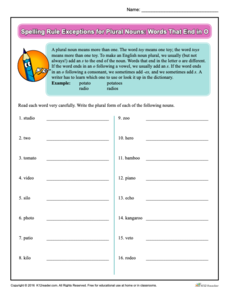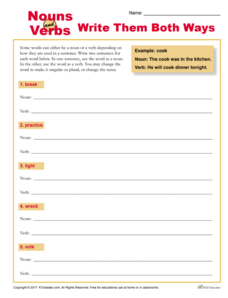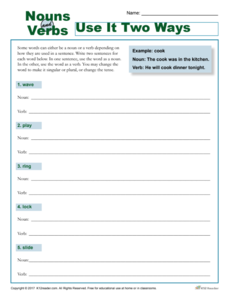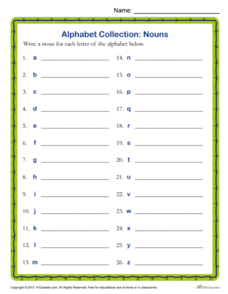Poetry4kids
Alliteration and Assonance Lesson Plan
Scholars analyze the poem My Puppy Punched Me in the Eye by Ken Nesbitt in order to locate examples of alliteration and assonance. After reading the poem, alliterative words are underlined and assonant words are circled.
Poetry4kids
How to Write an Alliteration Poem
Learners follow five steps to compose an alliteration poem. They choose one consonant and brainstorm as many nouns, verbs, and adjectives they can think of to create rhyming sentences that come together in a poetic fashion.
Poetry4kids
Simile and Metaphor Lesson Plan
Similes and metaphors are the focus of a poetry lesson complete with two exercises. Scholars read poetry excerpts, underline comparative phrases, then identify whether it contains a simile or metaphor. They then write five similes and...
K12 Reader
Change the Verbs to Nouns
Come one, come all to the grammar magic show—where you can transform verbs into nouns! A practice worksheet lists 10 verbs that require suffixes in order to become nouns.
K12 Reader
Spelling Rules: Add S to Nouns to Make Them Plural
Would you like more than one cat? Or more than one prize? Learn how to make singular nouns plural by adding an -s to the end of each word.
K12 Reader
Spelling Rule Exceptions for Plural Nouns: Words That End in Y
Changing the -y to an -ies in a plural noun isn't as straightforward as it sounds! Check out a learning exercise that features 20 singular nouns that need to be changed to plural nouns—and instructions about the grammar rule needed to do...
K12 Reader
Spelling Rule Exceptions for Plural Nouns: Words That End in X and Z
Pizzas is correct, not pizzaes. So why is sixes correct and not sixs? Sort out any grammar confusion with a worksheet on pluralizing nouns that end in -z or -x.
K12 Reader
Spelling Rule Exceptions for Plural Nouns: Words That End in O
Why do heroes and photos end in different ways? Learn the differences among different words that end in -o with a grammar exercise worksheet.
K12 Reader
Spelling Rule Exceptions for Plural Nouns: Words That End in CH and SH
Have you done the dishes? Or closed the hatches? A practice worksheet invites learners to check 20 words with different endings, and to add either -s or -es to each.
K12 Reader
Plurals: Nouns and Verbs Ending in Y
If a word ends in -y, to make it plural you change it to -es, right? Not always! Use a activity that addresses both nouns and verbs that end in -y and prompts learners to follow the grammar rule when changing each word.
K12 Reader
Find the Pieces: Predicate Adjective, Noun and Verb
This activity is helpful! Young grammarians review ten simple sentences, each with a subject, linking verb, and predicate adjective, before noting each part of speech appropriately.
K12 Reader
Nouns Verbs: Write it Both Ways
A worksheet gives scholars the opportunity to take five words and use them as a noun and a verb. Changing the verb tenses and making nouns singular or plural work to compose a grammatically correct sentence.
K12 Reader
Nouns Verbs: Use It Two Ways
Scholars show what they know about nouns and verbs in a worksheet that requires them to read five words then use them in two sentences—as a noun and a verb.
K12 Reader
Find the Abstract Nouns
A instructional activity challenges scholars to read 20 words then identify and circle the 11 abstract nouns.
K12 Reader
Find the Collective Noun
Scholars read eight sentences in order to identify then underline the collective noun in a part of speech practice page.
K12 Reader
Create a Collective Noun
A worksheet requires scholars to think up 10 collective nouns for singular words such as snowflakes, cups, basketballs, and more.
K12 Reader
Collective Nouns: Animal Match
Discover the collective nouns of 10 animals with a worksheet that asks scholars to match a singular noun to its corresponding plural form.
K12 Reader
Missing Nouns
Scholars use nouns from a word bank to complete sentences in a fill-in-the-blank worksheet that tells a tale about the California Gold Rush.
K12 Reader
Change the Nouns to Adjectives
A 10-item practice page requires scholars to change nouns to adjectives by adding the appropriate suffix.
K12 Reader
Replace with Proper Nouns
Three paragraphs make up a practice page all about proper nouns. Young grammarians choose from 12 words to fill in the blanks and complete sentences with the correct part of speech.
K12 Reader
Alphabet Collection: Nouns
A practice page challenges scholars to think up and list 26 nouns each starting with a different letter of the alphabet.
K12 Reader
Identifying Nouns
What's more fun than an afternoon at an art auction? A morning with a grammar learning exercise! After reading a short story about Jillian's trip to the art auction, learners jot down every noun from the passage, labeling each one as...
K12 Reader
Guess a Noun
Can you figure it out? A worksheet challenges grammarians to read 28 descriptions and guess what noun each one is describing.
K12 Reader
Sentence Writing: Conjunctions!
You don't need to be a grammar fan to use FANBOYS correctly—but it helps! Practice using conjunctions with a word bank of common connecting words and eight sentence prompts.

























